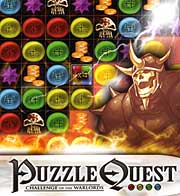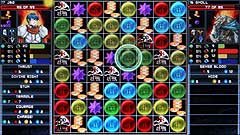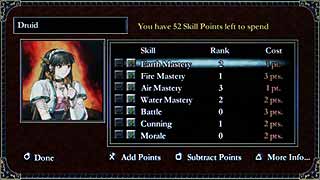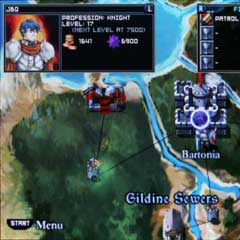Eugenia had seen a good review for Puzzle Quest on the PSP, and when I saw it at Fry's a few days ago I decided to give it a try. I knew that it was some kind of mix between a puzzle and an adventure game, but I hadn't read any further details so I didn't know what to expect.
The game description at the back of the box describes the game like this: "Puzzle Quest: Challenge of the Warlords delivers, for the first time ever, classic puzzle-game action backed with an epic story of good vs. evil.  Challenge your skills in single-player campaign mode, or battle your friends via wireless multiplayer. Experience a puzzle game like nothing you have ever seen before." Of course, nobody is going to tell you that their game isn't challenging or that it's been done dozens of times before, even if that was the truth. Challenge your skills in single-player campaign mode, or battle your friends via wireless multiplayer. Experience a puzzle game like nothing you have ever seen before." Of course, nobody is going to tell you that their game isn't challenging or that it's been done dozens of times before, even if that was the truth.
After opening the box, I started reading the manual. Reading the manual first was a mistake, because it reads pretty much like a reference manual, without any significant overview about how to play the game. Here's the entire description of the game, before the manual gets into the details of the menu system: "Enter the world of Etheria, a mythical land quickly becoming overrun with evil. You must help protect the kingdom of Bartonia from the undead invasion and seek out the source of those vile creatures to ensure the safety of your countrymen." As you can see, that's unhelpful when it comes to playing the game itself, and in fact it's even a mild spoiler. In general, the manual isn't very helpful because of its somewhat incomplete nature (as an example, the actual effect of +5 Skulls isn't described). Most of the aspects of the game are described through in-game tutorials and help, especially in quest mode, so that the manual isn't actually necessary if you start the game directly with a new quest.
The game itself is a hybrid of a decent puzzle game and of a shallow RPG. The puzzle aspects are the highlight of the game, as without them the rest of the game doesn't have much interest. At a high level, the puzzle  is essentially a clone of Bejeweled, which definitely qualifies it as "classic puzzle-based action": it contains 7 basic types of pieces on an 8x8 grid; at each turn two adjacent pieces must be swapped in order to align at least 3 identical pieces which then disappear; the holes that are created behind the disappearing pieces are filled by making the pieces above them fall down, and by having new pieces fall in from the top of the screen. It's pretty safe to say that you will like Puzzle Quest if you liked Bejeweled, and that if the basic game mechanics of Bejeweled didn't satisfy you you may want to think twice before purchasing Puzzle Quest. is essentially a clone of Bejeweled, which definitely qualifies it as "classic puzzle-based action": it contains 7 basic types of pieces on an 8x8 grid; at each turn two adjacent pieces must be swapped in order to align at least 3 identical pieces which then disappear; the holes that are created behind the disappearing pieces are filled by making the pieces above them fall down, and by having new pieces fall in from the top of the screen. It's pretty safe to say that you will like Puzzle Quest if you liked Bejeweled, and that if the basic game mechanics of Bejeweled didn't satisfy you you may want to think twice before purchasing Puzzle Quest.
As you start to play, you quickly realize that Puzzle Quest differs from Bejeweled in several significant ways. The most visible difference is the way puzzles in Puzzle Quest are actually battles against opponents: the player and a computer-controlled opponents take turns playing on a single game grid. This leads to a play strategy that is quite different from that in Bejeweled: leaving the grid in a favorable configuration is very desirable in Bejeweled, but can be quite harmful in Puzzle Quest if the opponent can take advantage of that configuration on its move. Another difference between Puzzle Quest and Bejeweled is that basic goal of the puzzle: while in Bejeweled the goal is essentially to not lose (by not running out time and not running out of moves) in Puzzle Quest the goal of each puzzle is typically to defeat an opponent: your  character and your opponent both have life points, and the goal is to drain all of your opponent's life. That is achieved my matching skulls on the game board: as a base line, your opponent will sustain one point of damage for each skull that you eliminate from the board. That brings us to another difference: in Puzzle Quest, each type of piece on the board has a side effect: the 4 types of gems add mana to your mana pool, the purple stars and the gold coins respectively give you experience and money, and the skulls deal immediate damage to your opponent. Each character in the game can cast spells during a battle (i.e. during a puzzle), and each spell requires a certain amount of mana of the appropriate color. Experience allows the character to gain levels, which allows to learn new spells and to improve the character's basic characteristics, while money allows to buy items that have some influence during battles. A character can only have a limited number of items and spells during any given battle, which means that choosing the spells and the items is important. character and your opponent both have life points, and the goal is to drain all of your opponent's life. That is achieved my matching skulls on the game board: as a base line, your opponent will sustain one point of damage for each skull that you eliminate from the board. That brings us to another difference: in Puzzle Quest, each type of piece on the board has a side effect: the 4 types of gems add mana to your mana pool, the purple stars and the gold coins respectively give you experience and money, and the skulls deal immediate damage to your opponent. Each character in the game can cast spells during a battle (i.e. during a puzzle), and each spell requires a certain amount of mana of the appropriate color. Experience allows the character to gain levels, which allows to learn new spells and to improve the character's basic characteristics, while money allows to buy items that have some influence during battles. A character can only have a limited number of items and spells during any given battle, which means that choosing the spells and the items is important.
All those aspects are accessible independently from the story aspect of the RPG, through "Instant Action". Interestingly enough, the experience and money gained through instant action transfer direction to the RPG side, so that it's possible to level up before even starting to follow the storyline.  In RPG mode, the character follows a story that contains approximately 150 quests (according to the box) and fights battles like the ones described above. There are quite a few additional aspects, though, which make the RPG mode a tiny bit deeper than a plain sequence of battles. In RPG mode, it's important to build up a city, as additional buildings allow to perform more actions. For instance, it is possible to capture enemies, and to train some of them to become mounts that can be taken into battle; capturing an enemy involves a special kind of puzzle where no new pieces are added to replace the ones that are removed, and where the goal is to clear the entire board. It is also possible to research new spells or to forge new items; both of those actions a performed in the appropriate building, with their own special variants on the basic puzzle rules. It is possible to siege and capture cities, to listen for rumors and to meet companions. Unfortunately, besides the special puzzles, there isn't much value in the RPG mode, as the story is really shallow. In RPG mode, the character follows a story that contains approximately 150 quests (according to the box) and fights battles like the ones described above. There are quite a few additional aspects, though, which make the RPG mode a tiny bit deeper than a plain sequence of battles. In RPG mode, it's important to build up a city, as additional buildings allow to perform more actions. For instance, it is possible to capture enemies, and to train some of them to become mounts that can be taken into battle; capturing an enemy involves a special kind of puzzle where no new pieces are added to replace the ones that are removed, and where the goal is to clear the entire board. It is also possible to research new spells or to forge new items; both of those actions a performed in the appropriate building, with their own special variants on the basic puzzle rules. It is possible to siege and capture cities, to listen for rumors and to meet companions. Unfortunately, besides the special puzzles, there isn't much value in the RPG mode, as the story is really shallow.
Overall, Puzzle Quest is a good value, offering varied and addictive puzzles. The RPG aspects won't win awards on their own, but they add nicely to the longevity of the game.
|